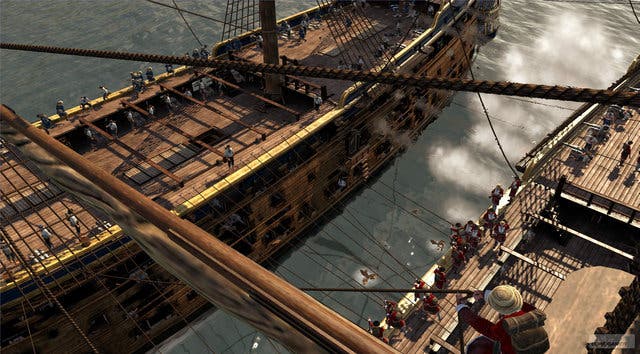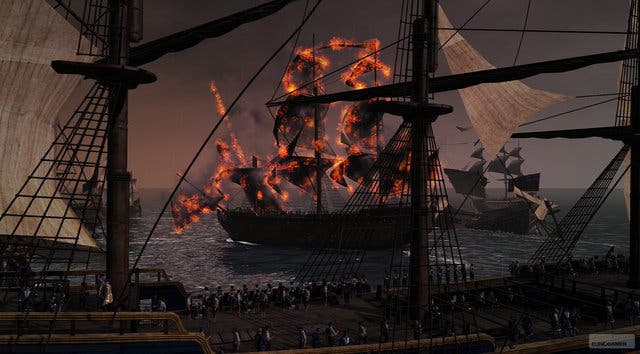Empire: Total War
When life gives you cannons, make Cannonade.
But now that I've mentioned fleets, I'd better get on to the biggest back-of-the-box feature: the ability to actually control sea battles for the first time. Like most back-of-box features, it doesn't actually make as much difference as you'd expect or hope. While it's mostly well-implemented, striking a balance between realism and playability, it's just not as interesting as the land battles.
Part of that is the nature of sea battles - they're all about fluidity and the constant movement of large single objects. While positioning is obviously key in land battles, it's an easier thing to get a strategic grasp of than a sea battle involving a handful of ships. In a closely fought sea battle, when I lose, I'm often unsure why, or what I should have done. Conversely, on land my failings are obvious. Since I didn't feel I was learning, I found myself building larger fleets and trusting to the auto-resolve. It's good to have them, but it's more of a welcome piece that's been missing from the grand tapestry of Total War than a reinvention.
It's the changes in the land battles which prove the game's most iconic and compulsive. There's a general shift away from siege warfare - partially precipitated by many of the economic structures which were previously inside settlements being placed in the country, partially because defences are pretty hefty investments - which shows off the mass battles to their full effect. The difference is also one of technology. Not the engine - which is stunning - but the actual weapons of the period. While melee is important, the massed line of muskets is the key image, and the effects of developing new drill on the battlefield change the tone entirely. Honestly, it's just lovely.

The standard Total War bugbear has also been addressed, with the AI hugely improved on both battlefield and strategic levels. Suicidal generals are a thing of the past, and they even have the capacity to surprise me a bit, especially with the mass strike. Considerably outnumbering me, the Cherokee piled directly for my general in a decapitation strike in the middle of a generally overwhelming assault - but the AI is just as capable of playing cagey.
Perhaps the biggest disappointment is that the game hasn't applied the rethink of the campaign map details to much of the real-time battles. Specifically, the siege maps remain a sore point. The path-finding simply isn't good enough to deal with manoeuvring around the castles in a timely fashion - really, I should be able to reliably man the cannons before the enemy closes within range to lob climbing ropes. It's actually worse when the ropes have struck home. Defenders have a horrible habit of leaving the castle via ropes when ordered to move places. Concentrating on a battle to find that one of your troops has decided to climb outside the castle and come back in, opening the gate and allowing cavalry to charge in... well, it's a low point. Loading pauses are painfully long, too.

Empire is a massive game with massive edges. They remain scrappy. It's these sort of things which keep it from a 10; that limit it to being merely one of the games of the year, one which I'm going to play another round of immediately.
In some ways, it's the closest we've come to the enormous social novel from the period after that which Empire chronicles: it's a Tolstoy-esque War and Peace of a game. Its problems may be the inevitable problems of trying something with such sheer scope. As such, if you want the breathtaking vision of the game, you have to accept the flaws in the details - for now, at least. I bet Tolstoy would have loved patches too.



